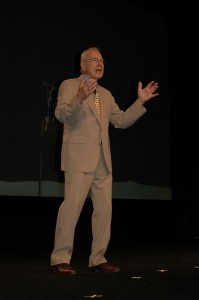‘Houston, We Have a Problem’

Jim Lovell spoke to APCO conference attendees about his crisis management experience during the Apollo 13 mission.
Lively music and the buzz of friendly conversation filled the convention center ballroom as conference attendees filed into the Opening Session at 8:30 a.m. APCO Executive Director George S. Rice Jr. began the session and welcomed attendees.
“It’s another year, another conference, another city and another set of opportunities to learn, act and connect,” said Rice. “As you know this year, we responded to the economic conditions by shortening the conference by a day. It’s all a part of our commitment to public safety.”
Rice also took a moment to recognize the hard work of the APCO AFC in helping agencies with licensing issues, and that of the APCO Institute to bring the best educational opportunities to members and public safety communications, as well as APCO’s work as a leader among public safety organizations. “APCO continues as a strong and leading partner in the APCO Global Alliance,” said Rice. “We established the Public Safety Alliance, which is a partnership among the leading public safety organizations, and launched a campaign to allocate the D-Block spectrum to public safety. … We have made great strides. This year’s successes are the result of our APCO Board of Directors and Executive Committee. Their determination has truly advanced our mission.”
Rice then introduced the members of the APCO Executive Committee and the members of the Board of Directors. Also present at the session were representatives from APCO’s international partners: APCO Canada President Curtis Brochu, BAPCO Executive Director Kevin Robson, and James Smart and Dave Williams from APCO Australasia. Rice also extended a special welcome to Public Safety and FCC Homeland Security and Public Safety Bureau Chief Jamie Barnett and the members of the NENA Executive Board present in the crowd.
Steve McGraw, director of the Texas Department of Public Safety and homeland security advisor to Gov. Rick Perry, took the stage to welcome the conference attendees to Houston. “I ask is radio interoperability worth it considering the cost? Really it’s not unless there is a disaster,” he said. “Texas has a full spectrum of threats … Here in the [convention center], we hosted many of our Louisiana brothers and sisters. And emergency personnel need to talk to firefighters who need to talk to police officers. … Interoperability is critical, and I congratulate those in this room that support that. We value our dispatchers, our radio communications experts and our 9-1-1 operators because everyday they save Texas.”
APCO President Richard Mirgon took the stage to highlight some of the association’s important accomplishments over the last year, including APCO’s leadership in creating a plan to reestablish communications in Haiti after the devastating earthquake in January and APCO’s establishment of the PSA to campaign for D Block reallocation to public safety.
He then presented APCO’s 2010 Public Safety Communications Awards. Winners were Debbie H. Fox, Comm Center Director of the Year; Cindy Skidmore, Telecommunicator of the Year; Nicholas Stepaniak, Trainer of the Year; Michele Hamilton, Information Technologist of the Year; Scott Walsh, Radio Technologist of the Year; and Natalie Heneks, Line Supervisor of the Year. Click here to read more about the winners.
Opening Keynote
Keynote speaker Jim Lovell told his story of teamwork and survival during NASA’s Apollo 13 mission in 1970. Steve Shank of Harris Corp. introduced him, saying, “This morning, I am proud to introduce to you a true American hero, who fully understands the meaning of mission critical communications.”
Lovell took the stage to the soundtrack of the Apollo 13 movie. “I love the music,” he said. “If there is any organization that relates to the story I am about to tell, it’s APCO. After the flight, we realized that Apollo 13 was not just another thrilling space adventure, but, in reality, a case of crisis management.”
Lovell described the qualities he believed helped him and his crew to survive the mission: leadership, teamwork, initiative, perseverance and motivation.
Two days after the crew entered space, they experienced life-threatening system failures and had to work with Mission Control on the ground in Houston to safely arrive home. “Communications was a lifesaver for us,” he said.
“The moral of the story is that I shouldn’t be here to talk to you,” said Lovell. “Why am I here? I am here because of the dedication of the group of people with the attributes of good leadership, innovation and teamwork who got us home safely. There are three types of people in the world: people who make things happen, people who watch things happen, and people who just wonder what happened. Back in 1970, there were people who made things happen in the Houston Control Center.”
APCO Member Ralph Gould of the Michigan Chapter says, “The keynote was excellent; excellent stories that we never heard in the media. It was more than him just losing an oxygen bottle. Communications—no one ever gave it as much credit as it deserved on the mission. It was one of the best keynotes we’ve had.”
About the Author
Natasha Yetman is associate editor of APCO’s Public Safety Communications. Contact us via e-mail at yetmann@apcointl.org.

